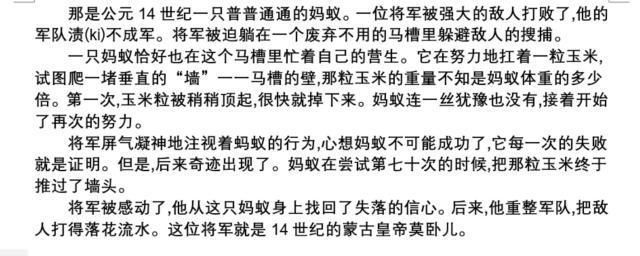外研版新标准英语九下M3U2-3的主要内容是用采访稿的形式,由一位70多岁的老奶奶向大家讲述了半个世纪以来人们生活中的种种变化文章从家庭生活、妇女地位、旅行交通和生活娱乐等方面对今昔生活作出比较,层次清楚,时态变化自然通过学习,学生可以更深刻地感受到社会的进步和历史的变迁,今天小编就来聊一聊关于英语九下外研版单词跟读?接下来我们就一起去研究一下吧!

英语九下外研版单词跟读
外研版新标准英语九下M3U2-3的主要内容是用采访稿的形式,由一位70多岁的老奶奶向大家讲述了半个世纪以来人们生活中的种种变化。文章从家庭生活、妇女地位、旅行交通和生活娱乐等方面对今昔生活作出比较,层次清楚,时态变化自然。通过学习,学生可以更深刻地感受到社会的进步和历史的变迁。
U2重点句子
1.She has lived in Beijing all her life.她一辈子住在北京。all one's life 一辈子;一生,常用于现在完成时态
2....and he often worked twelve hours a day outside in the winter cold or in the summer heat.(不管)寒冬或酷暑他经常一天在外工作12小时。(1)twelve hours a day 每天12小时(2)in the winter cold 在寒冬(3)in the summer heat 在酷暑
3.She didn't go out to work. 她不出去工作。go out to work 出去工作
4.and looking after us was more than a full-time job.照顾我们比做一份全职工作还要辛苦。look after=take care of 照顾
5.We could only eat meat once or twice a year.我们一年只能吃一两次肉。once or twice 一两次/偶尔
6.I wasn't sent to school because my family couldn't afford it,and what's more,because I was a girl.我没有上学,因为我的家庭负担不起,而且,因为我是一个女孩。(1)send 把......送到......;安排......去...... Her father sends her to learn to swim every weekend.(2)afford买得起;负担得起,常与can/could/be able to连用。The man couldn't afford to buy such a big house.(3)what's more 而且
7.She has a good education,and she goes to work even after getting married. 她受过良好的教育,甚至结婚后还去工作。(1)have a good education 接受良好的教育(2)go to work 上班/工作(3)get married 结婚
8.I'm happy to see she's busy working every day,but sometimes I feel lonely because she can't come to see me often. 我很开心看到她每天忙着工作,但是有时候我感觉孤独,因为她不能经常来看我。(1)be happy to do sth. 很开心去做某事(2)be busy doing sth.=be busy with sth.忙着做某事(3)every day 每天(4)feel lonely 感觉孤独
9.Now you can take the bus everywhere. 现在你可以坐公交车去每个地方。take the bus to...=go to...by bus坐公交车去......,如果地点是副词,to 省略。He takes the bus to school every day.=He goes to school by bus every day.
10.And you young people can take a plane to anywhere in the world.而且你们年轻人可以坐飞机去往世界的任何地方。(1)you young people 你们年轻人,同位语(2)take a plane to...=go to...by plane 坐飞机去......(3)anywhere 在该句中是名词,所以前面to不省略。
11.The only thing I don't like, though, is that there's so much more traffic.不过,只有一件事我不喜欢,那就是交通更加频繁。though在该句中用作副词,意为“不过;可是”,多用于主句后,引出补充说明,使语气变弱。though还可以做连词,意为“虽然;尽管”,引导从句,不能与but连用。Though he is ill, he still goes to work.
12.It's so difficult to cross the road.过马路是那么难。(1)It's 形容词 (for sb.) to do sth.对......来说做某事是......(2)cross the road 过马路
13.There're so many good programmes...有那么多好节目。so many 名词(复数),如此多/那么多......so much 不可数名词,如此多/那么多......
14.Generally speaking,I think life is better today. 总而言之/总得来说,我认为今天的生活更美好。generally speaking 总而言之/总得来说
U3重点句子
1.You asked me for help about your school project.ask sb.for help 请某人帮忙
2.I searched online and found out the following.我通过在线查询找到了下列资料。(1)search online 在线查询 (2)find out 查明
3.Thousands of people came to the cities to work in the factories. 成千上万人来到城市去工厂工作。(1)thousands of 成千上万;数以千计的thousand与of连用加s,如果thousand 前面有具体数字不用加s。two thousand birds 两千只鸟 (2)to work 不定式表示目的
4.Can you imagine that? 你能想象那种情况吗?imagine 想象;猜想;认为,后面加 句子/动词ing形式/名词/代词。Don't imagine flying in the sky.
5.The pollution from factories filled the air.来自工厂的污染充满了空气。fill...with...用......装满......;She filled her bag with lots of books;fill out 填写;full 满的,形容词,be full of 充满......装满......
6.As a result, there were many illnesses.结果,有很多疾病发生。(1)as a result 结果,as a result of...由于/ 因为......(2)illness 疾病,名词。ill 生病的,形容词,放在be 后。
7.Write to me if you need more information. 如果你需要更多的信息,给我写信。(1)write to sb. 给某人写信 (2)information 信息,不可数名词。
8.The modern car has changed life a great deal. 现代汽车极大地改变了生活。a great deal 大量;非常,可以修饰动词;a great deal of 大量的/非常多的 不可数名词 A great deal of milk is in the glass.
9.There were so many horses in large cities that it was almost impossible to get rid of the manure.在大城市中有那么多马以致于不可能摆脱粪便问题。(1)so many 可数名词复数,如此多/那么多的......(2)It is 形容词(for sb.)to do sth.对......来说做某事是......(3)get rid of 摆脱;丢弃
,




